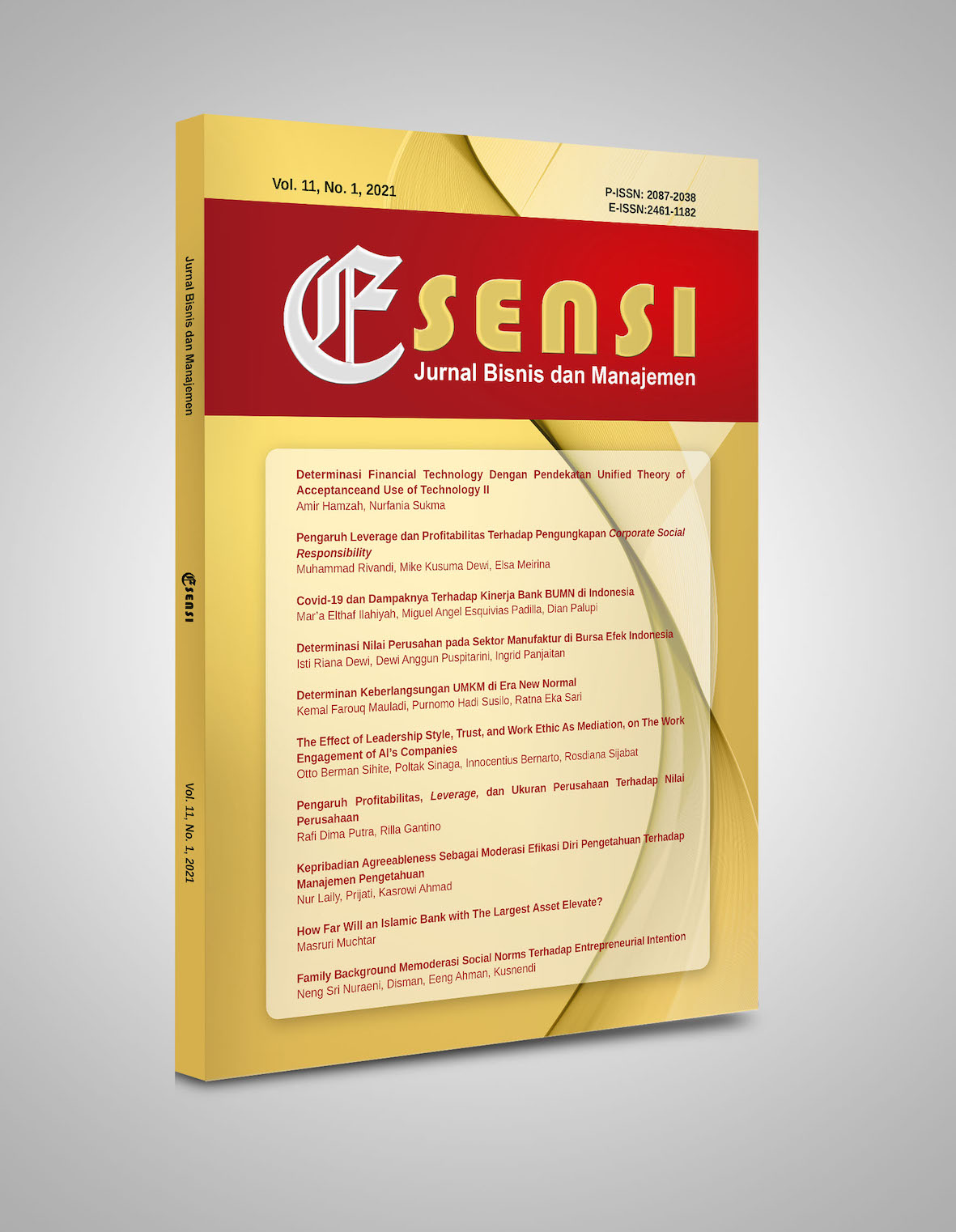The Effect of Leadership Style, Trust, and Work Ethic as Mediation on The Work Engagement of AI's Companies
DOI:
https://doi.org/10.15408/ess.v11i1.20247Keywords:
leadership style, trust, work ethic, work engagementAbstract
The objective of the research purpose is to analyze if there is an effect of the Leadership Style, Trust, and Work Ethic, towards Engagement especially to the service department. Due to the fact that complaints increased from customer and impact to less satisfactory. A quantitative approach, with path analysis, and survey research designs using a questionnaire used to test hypotheses for employees in the service section from the labor level to the Supervisor position. Total samples 78 people taken from 100 populations. It was discovered from the results, that work ethic has a positive and important influence on working engagement that decrease the level complaints, which makes this research special since no related research has been done so far.
Cara Mengutip:Sihite, O. B., Sinaga, P., Bernarto, I., & Sijabat, R.. (2021). The Effect of Leadership Style, Trust, and Work Ethic as Mediation on The Work Engagement of AI's Companies. Esensi: Jurnal Bisnis dan Manajemen, 11(1), xx-xx. https://doi.org/10.15408/ess.v11i1.20247.
References
Abdillah, W., & Hartono, J. (2015). Partial Least Square (PLS): Alternatif Structural Equation Modeling (SEM) dalam Penelitian Bisnis. Penerbit Andi: Yogyakarta
Alfes, K., Shantz, A., & Alahakone, R. (2016). Testing Additive Versus Interactive Effects of Person-Organization Fit and Organizational Trust on Engagement and Performance. Personnel Review, 45(6), 1323-1339.
Andersen, B., Busi, M., & Onsøyen, L. E. (2014). Performance Management Practice and Discipline: Moving Forward or Standing Still? International Journal of Business Performance Management, 15(2), 117-126.
Batista-Taran, L. C., Shuck, M. B., Gutierrez, C. C., & Baralt, S. (2009). The Role of Leadership Style in Employee Engagement. In Plakhotnik, M. S., Nielsen, S. M., & Pane, D. M. (Eds.). Proceedings of the Eighth Annual College of Education & GSN Research Conference, 15-20.
Brown, M. E., Treviño, L. K. & Harrison, D. A. (2005). Ethical Leadership: A Social Learning Perspective for Construct Development and Testing. Organizational Behavior and Human Decision Processes, 97(2), 117-134.
Eubanks, D. L., Brown, A. D., & Ybema, S. (2012). Leadership, Identity, and Ethics. Journal of Business Ethics, 107(1), 1–3. https://doi.org/10.1007/s10551-012-1295-5
Demirtas, O., & Akdogan, A. A. (2015). The Effect of Ethical Leadership Behavior on Ethical Climate, Turnover Intention, and Affective Commitment. Journal of Business Ethics, 130, 59-67. https://doi.org/10.1007/s10551-014-2196-6
Den Hartog, D. N., & Belschak, F. D. (2012). Work Engagement and Machiavellianism in The Ethical Leadership Process. Journal of Business Ethics, 107, 35-47. https://doi.org/10.1007/s10551-012-1296-4.
Dewettinck, K., & van Dijk, H. (2013). Linking Belgian Employee Performance Management System Characteristics with Performance Management System Effectiveness: Exploring The Mediating Role of Fairness. The International Journal of Human Resource Management, 24, (4), 806-825.
Engelbrecht, A., Heine, G., & Mahembe, B. (2017). Integrity, Ethical Leadership, Trust and Work Engagement. Leadership & Organization Development Journal, 38(3), 368-379.
Eriyanto, A. W., Sunaryo, H., & Khoirul ABS, M. (2019). Pengaruh Human Relation, Kondisi Lingkungan Kerja dan gaya Kepemimpinan Terhadap Etos Kerja (Studi Kasus Pada Pengurus Koperasi Mahasiswa Ilham Ramadhan Universitas Islam Malang). Jurnal Ilmiah Riset Manajemen, 8(2), 81-90.
Guridno, E. (2020). Analysis of Leadership Style, Organizational Culture on Job Satisfaction and the Impact on Employee Performance. International Research Journal of Advanced Engineering and Science, 5(4), 234-240,
Hair, J. F., Ringle, C. M., & Sarstedt, M. (2011). PLS-SEM: Indeed a Silver Bullet. Journal of Market. Theory & Practice, 18(2), 139–152.
Kaptein, M. (2009). Ethics Programs and Ethical Culture: A Next Step in Unravelling Their Multi-faceted Relationship. Journal of Business Ethics, 89(2), 261–281.
Malik, M. F., & Khan, M. A. (2019). Tracking Engagement Through Leader: Authentic Leadership’s Consequences on Followers’ Attitudes: A Sequential Mediated Mode. International Journal of Public Administration, 43(10), 831-838.
Mariappanadar, S. (2018). The Impact of Dissonance in Schema Based Leadership Perceptions on Employee Engagement: Evidence from Australia. Personnel Review, 47(7), 1309-1329. https://doi.org/10.1108/PR-03-2017-0081
Paul, J., Mittal, A., & Srivastav, G. (2016). Impact of Service Quality on Customer Satisfaction in Private and Public Sector Banks. International Journal of Bank Marketing, 34(5), 606-622. https:// doi.org/10.1108/IJBM-03-2015-0030.
Popli, S., & Rizvi, I. A. (2017). Leadership Style and Service Orientation: The Catalytic Role of Employee Engagement. Journal of Service Theory and Practice, 27(1), 292-310. https://doi.org/10.1108/JSTP-07-2015-0151.
Sharma, N. P., Sharma, T., & Agarwal, M. N. (2016). Measuring Employee Perception of Performance Management System Effectiveness: Conceptualization and Scale Development. Employee Relations, 38(2), 224-247.
Sugiyono. (2008). Metode Penelitian PendidikanPendekatan Kuantitatif dan R&D. Alfabeta: Bandung.
Ugwu, F. O. (2013), Work Engagement in Nigeria: Adaptation of the Utrecht Work Engagement Scale for Nigerian Samples. International Journal of Multidisciplinary Academic Research, 1(3), 16-26.
Ugwu, F. O., Onyishi, I., & Rodríguez-Sánchez, A. M. (2014). Linking Organizational Trust with Employee Engagement: The Role of Psychological Empowerment. Personnel Review, 43(3), 377-400. https://doi.org/10.1108/PR-11-2012-0198.
Victor, J., & Hoole, C. (2017). The Influence of Organisational Rewards on Workplace Trust and Work Engagement. SA Journal of Human Resource Management, 15, a853.


